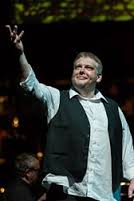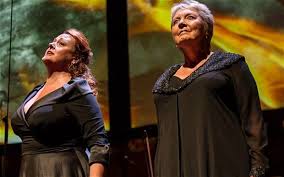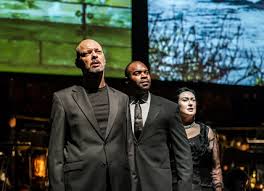Birmingham Symphony Hall, 21 June 2014
Midsummer’s day 2014, and the climax of four years of magnificent music making. Opera North’s presentation of Gotterdammerung had all the excitement of the earlier operas in this Ring Cycle but had also refined the staging so that the simplified, symbolic gestures were always apt and never interfered with the musical narrative. To take one example, at the end of Act One Siegfried stood behind Gunther when in disguise and then stepped in front of him when he removed the tarnhelm. Simple, but masterly. There are no swords, spears or even a ring, yet we can clearly see them all the time – such is the conviction of the singers.
Moreover, what could so easily have been a concert performance with pictures was a finely honed interpretation, as good as any one might wish for in a fully staged version. None of the protagonists is evil. Even Hagen is driven by the curse that his father has placed on the ring, as are all of the characters here. There is a continuing sense of hope throughout this approach which is dashed as the curse works its way into the unfolding narrative.
While the Norns are doom laden there is a genuinely exultant duet for Brunnhilde and Siegfried at the start of act one, and this continues until Gunther/Siegfried return to Brunnhilde’s rock. Eric Greene’s Gunther has nobility and stature, which makes his collapse in act two all the more tragic. Similarly Olga Boylan’s statuesque Gutrune is out of her depth once her world starts to fall to pieces. There is no sense of cunning manipulation here. Mats Almgren is a slippery Hagen, not a man to trust for a moment, but one drive by inner demons which distort his sleep and wrack his body.
Susan Bickley is so good as Waltraute it is a pity she only appears in the one scene. Her sensitivity and the complexity of her emotions as she speaks of the disintegration of the gods was magnificent.
At the heart of the evening was Alwyn Mellor’s Brunnhilde and Mati Turi’s Siegfried. They spark so well off each other, the second act confrontation was almost unbearable. Her anger and lust for revenge was heightened by the love and joy she had poured out in the opening act, all of which was resolved in a radiant Immolation scene.
Just occasionally Mati Turi’s Siegfried seemed to be tiring, particularly towards the end of the second act, but he had more than enough resources for a very moving death scene after the lighter interaction with the Rhine Maidens. He brings an innocence and warmth to Siegfried which makes Wagner’s own love of the hero so much more palpable.
The orchestra and chorus of Opera North, within the glorious acoustic of the Birmingham Symphony Hall, could do no wrong. The orchestra under Richard Farnes was particularly impressive in the many quieter passages of the opera –the Alberich/Hagen scene and Brunnhilde’s ruminations after the oath scene. Much of the orchestration here seemed to be looking forward, not just to Parsifal but beyond to Schoenberg.
I understand this is not the end of their Wagner mission and that we are to get Der Fliegende Hollander next year. Hurray – I can’t wait.




